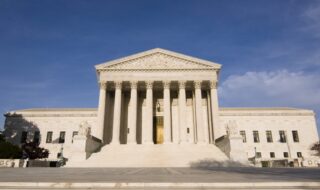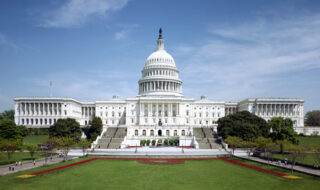Topics:
September 4, 2024
NFIB Small Business Legal Center’s top five dealt with important small business issues
Clean Water Act, California Clean Air Act Among NFIB Legal Center Amicus Filings
- San Francisco v. EPA – filed in the U.S. Supreme Court, asks whether the EPA and States can issue vague water quality standards under the Clean Water Act. NFIB argues that water quality standards must be specific, or businesses will open themselves up to the threat of enforcement and harmful activist lawsuits.
- E.M.D Sales, Inc. v. Faustino Sanchez Carrera – filed in the U.S. Supreme Court, asks what standard of proof courts should use to determine if an employee is exempt from overtime pay requirements under the Fair Labor Standards Act (FLSA). NFIB argues that the Fourth Circuit’s standard is unnecessarily high, twists the FLSA, and harms businesses.
- Diamond Alternative Energy, LLC v. EPA – filed in the U.S. Supreme Court, asks whether California should be allowed to regulate vehicle emission standards for the entire country. NFIB argues that the Court should review California’s Clean Air Act waiver, which is unlawful.
- Advance Stores Co. v. Birthwright – filed in the Second Circuit Court of Appeals, asks whether New York labor law allows for a private right of action lawsuit under New York’s weekly payment law for manual workers. NFIB argues that New York labor law does not allow for a private right of action and that such claims have flooded New York courts and placed an enormous liability risk on small businesses.
- Gardner v. Norman – filed in the Utah Supreme Court, asks whether Utah should allow plaintiffs in personal injury cases to recover the full list price of medical care. NFIB argues that plaintiffs should recover the amount actually paid for their medical care rather than an inflated estimate.
Get to know NFIB
NFIB is a member-driven organization advocating on behalf of small and independent businesses nationwide.
Related Articles

July 10, 2025
Historic Legislation Becomes Law and Stops Massive Tax Hike on…
The One Big Beautiful Bill Act is signed into law, permanently extending th…
Read More


July 10, 2025
Small Businesses Get Key Wins During 2024-25 U.S. Supreme Court…
The NFIB Small Business Legal Center secured three much-needed wins on beha…
Read More


July 9, 2025
Small Businesses Succeed in Challenge to FTC’s Automatic Rene…
NFIB wins lawsuit challenging the FTC’s Negative Option Rule, which targe…
Read More


July 8, 2025
AUDIO: NFIB’s Jeff Brabant Discusses BOI Repeal on SiriusXM�…
NFIB Vice President of Federal Government Relations Jeff Brabant joined POT…
Read More







